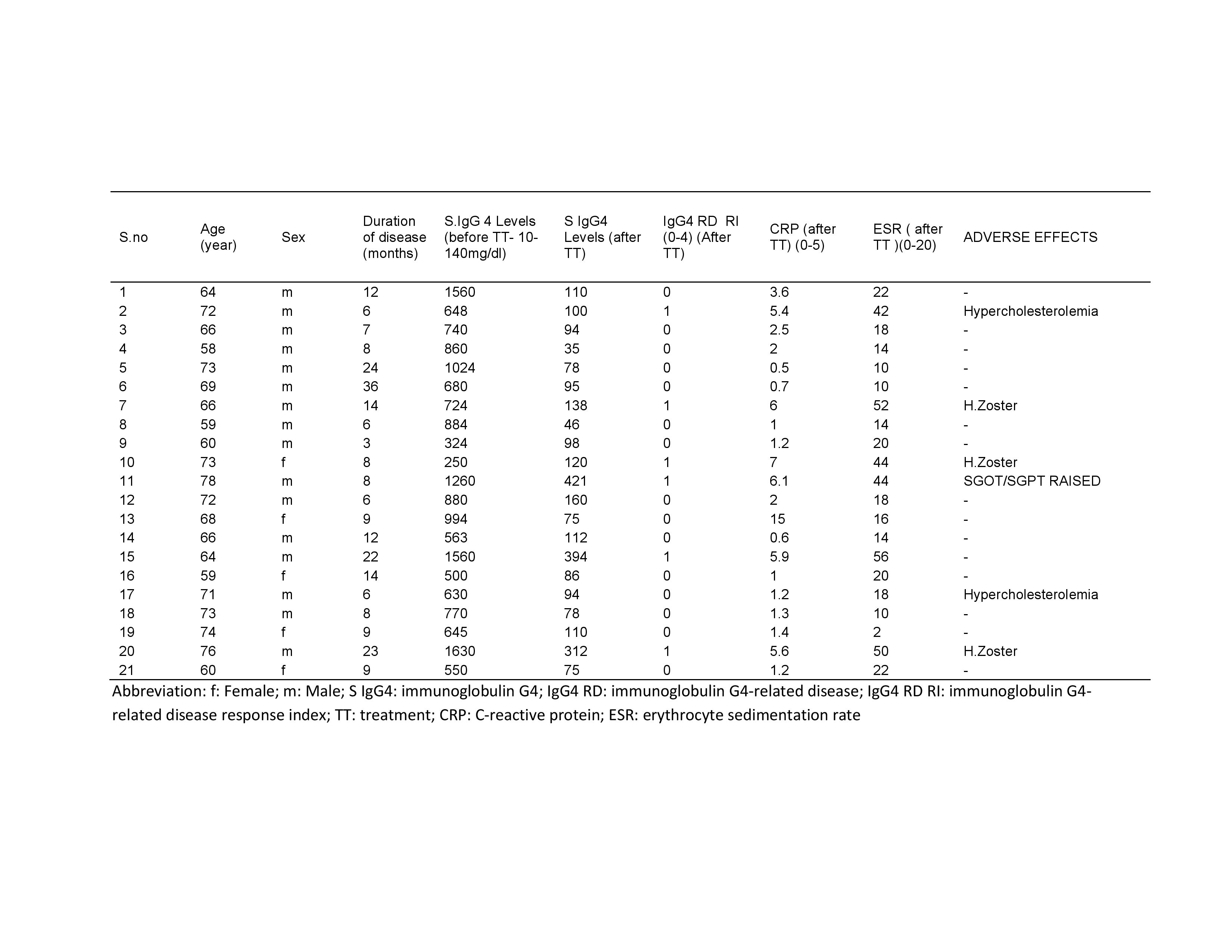Session Information
Session Type: Poster Session C
Session Time: 10:30AM-12:30PM
Background/Purpose: We did an observational study to assess the efficacy and safety of the Janus kinase (JAK) inhibitor tofacitinib in patients having refractory IgG4-Related Disease (IgG4-RD).
Methods: Twenty one patients under treatment at three centres of Rheumatology and Clinical Immunology spread over different places in India were enrolled and observed for a minimum duration of one year . All the patients fulfilled the 2019 American College of Rheumatology(ACR)/ European League Against Rheumatism (EULAR) classification criteria for IgG4-RD. Refractory IgG4-RD was considered when patient was on prednisolone dose > 20 mg /day despite addition of methotrexate / Azathioprine . Patients were initiated on tofacitinib twice daily, with simultaneous continuation of glucocorticoids therapy. They were followed-up for 12 months . No patient was lost to follow up and follow up visit was scheduled every 2 months. On every visit, IgG4-RD responder index (IgG4-RD RI) , serum IgG4 levels , CRP , ESR and adverse events (AEs) were noted and assessed. Clinical remission was calculated based the changes of IgG4-RD RI scores and other parameters.
Results: The demographic data of twenty one patients and their clinical response have been documented in the Table 1 below . All the twenty one patients showed significant improvement , there was a significant decrease in serum IgG4 levels in all the patients . Six out of twenty one patients showed improvement with IgG4-RD RI scores of 1, but raised CRP and ESR levels and rest patients showed complete remission with IgG4-RD RI scores of 0 during the follow-up. Four patients had raised IgG4 levels ( > 140 mg /dl ), rest all patients were able to achieve levels had Three patients were able to stop steroids , five patients had maintainence dose above 10 mg of prednisolone. Thirteen patients were able to taper dosage below 10 mg of prednisolone. Most of the patients were able to tolerate the drug, three patients suffered Herpes Zoster, two patients had hypercholesterolemia and one patient had minor transaminitis. All of them recovered uneventfully and patients were successfully followed for 12 months with insignificant disease course and no major flare ups.
Conclusion: Our results pave a gateway for exploring role of tofacitinib in treatment of refractory IgG4-RD, as a steroid sparing agent to attain clinical remission. This study has shown that Tofacitinib offers a rosy approach to treatment in IgG4-RD. Future studies enrolling more number of patients should be encouraged to tap the potential of small molecules like Tofacitinib where conventional agents fail to deliver .
To cite this abstract in AMA style:
Singh J, BAJAD S, TANNA D. Can Tofacitinib Be the Saviour in Treatment of Refractory IgG4-Related Disease : A Multicentre Experience from India [abstract]. Arthritis Rheumatol. 2024; 76 (suppl 9). https://acrabstracts.org/abstract/can-tofacitinib-be-the-saviour-in-treatment-of-refractory-igg4-related-disease-a-multicentre-experience-from-india/. Accessed .« Back to ACR Convergence 2024
ACR Meeting Abstracts - https://acrabstracts.org/abstract/can-tofacitinib-be-the-saviour-in-treatment-of-refractory-igg4-related-disease-a-multicentre-experience-from-india/

